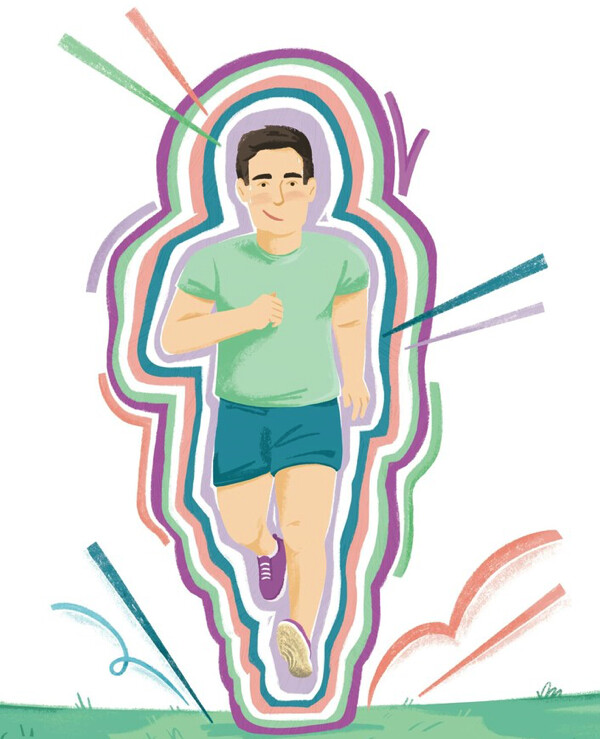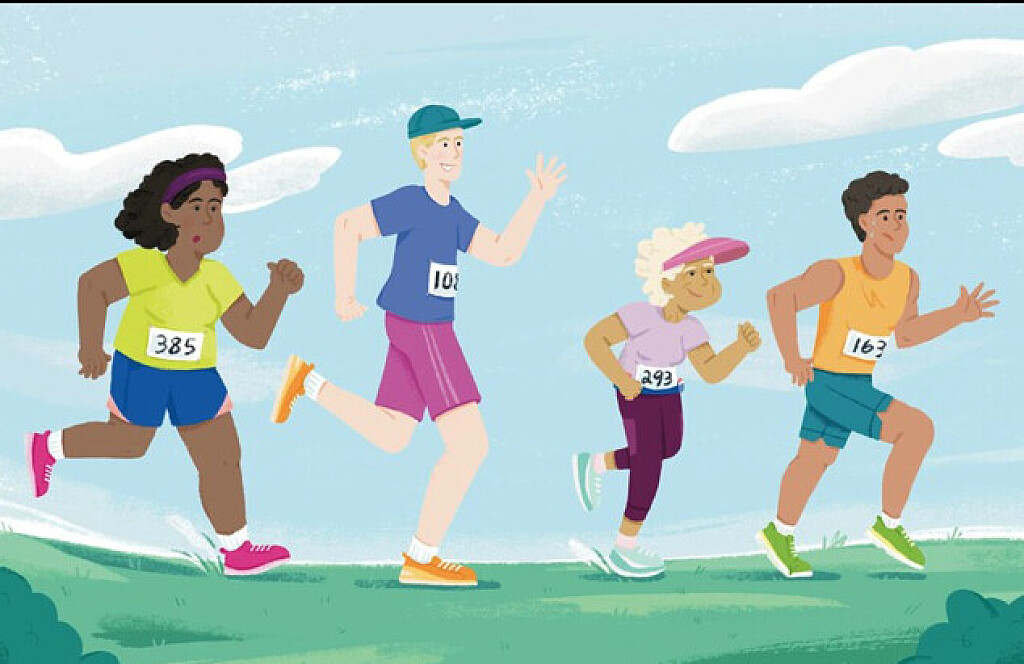Running News Daily
Running News Daily is edited by Bob Anderson. Send your news items to bob@mybestruns.com Advertising opportunities available. Train the Kenyan Way at KATA Kenya and Portugal owned and operated by Bob Anderson. Be sure to catch our movie A Long Run the movie KATA Running Camps and KATA Potato Farms - 31 now open in Kenya! https://kata.ke/
Index to Daily Posts · Sign Up For Updates · Run The World Feed
THE TRUTH ABOUT RUNNING AND WEIGHT LOSS
When approached realistically, running can be an excellent tool for weight loss and weight management, but don’t be fooled by the numerous myths surrounding them
People often start running to drop a few pounds. Hopefully, they fall in love with it, move beyond the number on the scale and continue running for its many other benefits; but for many people, it’s impossible to decouple running from the weight-loss goal. When done correctly, running can help people struggling with excess weight to shed pounds—and continuing to run can be effective way to keep them off. But the subject of running and weight loss is fraught with mythology. We delve into some of the problems with the weight-loss approach to running, including what actually works, what definitely doesn’t and how to keep running as part of your life, regardless of whether you lose weight.
Myth


You can run a marathon PB while dropping 10 pounds
You can do anything, but you can’t do everything. As a rule, you won’t boost performance at the same time that you’re purposely losing weight. Often, the opposite is true, says Kylee Van Horn, RD, owner of Flynutrition in Boulder, Colo. When you’re restricting your food intake, you’re unlikely to make performance gains, but unfortunately, we often equate being faster with being thinner.
“The first thing I tell a client with a weight-loss goal is that losing weight will not necessarily make you a faster runner,” adds Carla Rodriguez Dimitrescu, PhD, an Edmonton-based expert in nutrition and metabolism who works primarily as a running coach. It’s fine if weight loss is your goal—but don’t confuse it with performance, because the way that you’ll get faster isn’t necessarily the way that you’ll drop a pound a week (which should be the maximum weight you’re losing per week, unless advised otherwise by your doctor).
Myth
There is one “runner’s body”
Let’s be clear: there is no single body type that signifies “runner.” Often, people with weight-loss goals who run have a vision in their minds of the long, lanky phenotype often associated with marathoners. But runners come in all shapes and sizes—and if you run, you have a runner’s body, period.
Even in the professional sphere, there are different body types that excel at different types of running. “You would never tell a professional runner that he doesn’t look like an astrophysicist,” says Dimitrescu. “But for some reason, that astrophysicist is upset that he doesn’t look like a runner.” She adds that people have different somatotypes, which means that genetics and environment will both play a role in how running (or dieting, or strength training) changes your body. And if you really want to see how every body is a runner’s body, sign up for a local 5K race and look around you at the start.
Still, the “runner’s body” myth runs deep, and it can be hard to break free of the desire to be ultra-thin. That’s why Stevie Lyn Smith, RD, a board-certified sports dietitian based in Buffalo, N.Y., tries to focus her clients on health outcomes as well as esthetic goals. “We try to look at other goals, like running your personal best in a race,” she says. “Maybe you won’t achieve whatever physique is jammed in your mind as the ‘ideal,’ but you’re able to appreciate these non-body-focused victories.”
Myth
Lighter is healthier/faster
Here’s an oversimplified example: say you’ve had the stomach flu for a week. You’ve lost seven pounds during that time, thanks to days spent in agony. You head out for your first run since you got sick. How does it go? That’s right—dropping weight doesn’t always lead to speedy running, and while that’s an extreme example, it’s not much different from how you’d perform after a week of crash dieting.
“Slimmer is not necessarily better,” says Dimitrescu. “And too much weight loss or restriction can lead to issues like stress fractures, increased rates of illness and injury and chronic fatigue. That’s not going to make you healthier or faster.”
And unfortunately, Don Henley was right when he sang, ‘You can’t go back, you can never go back.’ If, at 46, you’re mourning your running prowess or body composition from when you were 17, you may need to come to terms with the fact that your body isn’t the same, and no amount of training or restricting will get you there. You need to find your new healthy, speedy body, says Van Horn.
Myth
Runners can lose weight faster by eliminating carbs
Skip any diet that eliminates entire macronutrient groups, says Dimitrescu. These fad diets come and go, and for someone who wants to be a healthy, optimized runner, they’re just not worth it. “I don’t like any restrictive diet that advocates for super low calories or eliminates a macronutrient,” she says.
“My priority is always that clients get plenty of protein—at least one gram per kilogram of body weight—and adequate carbohydrates. People have a fear of carbohydrates, but if you don’t eat enough carbs, you’re going to use the protein as your source of energy instead of using it to help build and repair muscle. You’re not doing any favours to your body if you don’t provide it with the energy it needs to do the work that you’re asking it to do.”
Myth
Running earns you calories
A common saying about running is that you run to eat. But really, you should be eating to run. “Don’t create a reward/punishment mentality around running and food,” says registered dietitian and runner Lindsey Elizabeth Cortes of San Antonio, Texas. “Try to focus on how you fuel and how you train as lifestyle choices and not things that need to be rewarded or punished.”
For example: it’s not, “I had a great run, so now I get to reward myself with nachos,” nor is it “I had a bad run, so now I can only eat a salad.” Instead, reframe to: “I ran, and now I’m craving nachos! Maybe I’ll have nachos with a salad.” Or, “I didn’t run, and I’m craving nachos. Maybe I’ll have nachos with a salad.”
Myth
Fasted running and intermittent fasting will speed up weight loss
Yes, fasted runs and intermittent fasting may potentially have some longevity and fitness-based benefits, but when it comes to weight loss, they’re not going to move the needle. In fact, they might be sabotaging your efforts. “For most people, things like fasted runs and intermittent fasting just equate to saving up their calories until the end of the day and then overdoing it in the evening, or using these so-called ‘healthy’ concepts to put a healthy spin on unhealthy, restrictive eating patterns,” says Van Horn. “But if you look into the research, there’s no benefit for doing fasted training for weight loss. In fact, we know that fasted running can raise cortisol levels, which can make weight loss harder.”
Intermittent fasting that takes place around your running window means that your runs aren’t being fuelled—which can both decrease your running performance and make it harder to lose weight, since you’re more likely to over-indulge later in the day. “At minimum, fuel around your workouts and during your training, so that you have enough calories on board to develop some adaptations and buffer the stress of the workout,” says Van Horn. She adds that if weight loss is the goal, you can reduce calories at meals that aren’t near your workout window. Calories should come out of meals that aren’t right before or after your runs. Lowering your portion of rice with dinner or cutting out dessert if you trained in the morning will give you greater results than skipping your post-run snack. (But keep your caloric deficit at a maximum of 500 calories per day.)
Things like fasting and fat adaptation (training your body to optimize fat over glycogen for fuel) may sound like they’re about weight loss, but the reality is that neither is likely to help you lose weight. Some research has found that when done under the right conditions, they might increase certain health markers or improve longevity, but they’re not the weight-shedding tools you may think they are.
Myth
The more you run, the more weight you lose
The natural inclination of someone who wants to lose weight by running is to run longer. Usually, the idea of training for a marathon or half-marathon gets floated around. But running shorter routes, with some harder efforts thrown in, will lead to better weight loss outcomes, because you’re able to get the benefits of the run cardio without as much stress on the body. And because the more you run, the more you need to fuel, chasing higher mileage is actually a bit of a fool’s errand, where weight loss is concerned.
“Endurance sport is not a weight management tool,” says Smith. “Volume-wise, if you’re running more than 10 hours a week while also working a normal job, spending time with family, dealing with all of those normal responsibilities, the long-term stress of that is not going to be conducive to weight loss. With a more appropriate training load for your current lifestyle, it’s easier for you to manage stress, and you’ll see better results.”
Myth
The number on the scale is the only number that matters
Rather than focusing on your weight in pounds, look at different metrics. “I like a combination of measurements with a soft tape measure, how a certain item of clothing fits, and scale weight done once a month,” says Van Horn. While body composition-measuring tools like a DEXA scan are often considered the gold standard, they are expensive and often difficult to access, so rather than spending time and money on that, focus instead on simple measurements that are replicable.
Daily weigh-ins are also a mistake, says Van Horn. Our bodies fluctuate from day to day, so scale weight on a daily basis can be disheartening. Instead, shift to weekly or monthly and look for a general trend rather than placing any importance on half a pound.
Finally, it’s not all about your body weight or size. Dimitrescu recommends looking at fitness and health markers, such as your resting heart rate, blood glucose levels, and HDL and LDL cholesterol. Often, these markers will improve quickly once you adopt a running habit and focus on healthy eating, and can help you see that even if the number on the scale isn’t changing, your body is.
In fact, research has shown that a focus on getting into the habit of running regularly actually is more effective for long term weight loss than focusing on the number on the scale—so it may be worth shifting your focus to the number of times per week you’re physically active, or minutes spent moving.
Login to leave a comment




